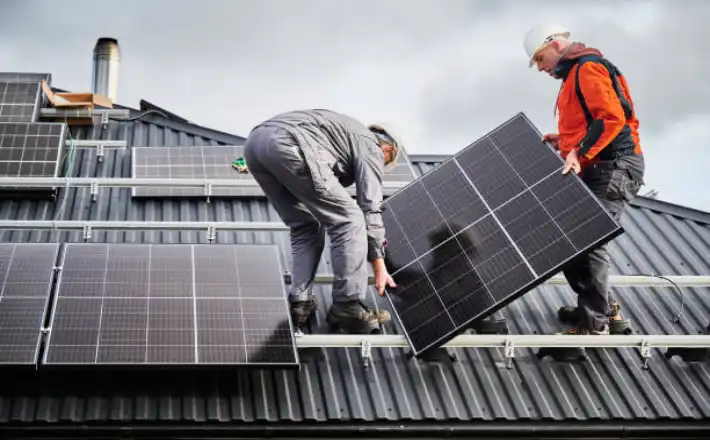What Sets EU Photovoltaic Equipment Suppliers Apart From Global Competitors?
When you consider the landscape of photovoltaic equipment suppliers, it’s clear that EU companies bring unique qualities to the table. Their adherence to stringent regulatory standards not only enhances product quality but also fosters consumer trust. Coupled with a strong commitment to sustainability, these suppliers are innovating at a pace that keeps them ahead in the global arena. But what really drives their competitive edge is a robust supply chain that minimizes environmental impact while ensuring efficiency. As you explore this further, you might wonder how these factors play out in real-world applications and market dynamics.
Stringent Regulatory Standards
Stringent regulatory standards play an essential role in shaping the landscape of photovoltaic equipment suppliers in the EU. These standards guarantee that solar panels meet high efficiency and safety benchmarks, ultimately fostering consumer trust and market growth. You’ll find that EU regulations mandate rigorous testing and certification processes, which can greatly influence production costs and timelines for suppliers.
For instance, the European Union’s Ecodesign Directive sets energy efficiency criteria, compelling manufacturers to innovate continuously. This creates a competitive edge for suppliers who can adapt quickly to regulatory changes while maintaining compliance. Additionally, the EU imposes strict environmental regulations, promoting sustainable sourcing and production methods.
When you consider that approximately 80% of solar panels used in the EU market are sourced from compliant suppliers, it’s clear that these standards shape purchasing decisions. Suppliers that align with EU regulations often enjoy better access to market opportunities and financing options, as investors prefer companies that prioritize compliance and sustainability.
Commitment to Sustainability
As the photovoltaik sector evolves in the EU, a strong commitment to sustainability has emerged as a key differentiator among suppliers. You’ll find that EU companies increasingly prioritize eco-friendly practices, not just to comply with regulations but to build brand loyalty and trust. Data shows that 75% of consumers are more likely to engage with brands that demonstrate sustainable practices.
When it comes to photovoltaic equipment, suppliers are investing in renewable materials and adopting circular economy principles. For instance, many are now utilizing recycled components in their manufacturing processes, which considerably reduces waste and energy consumption. This approach not only minimizes the carbon footprint but also appeals to environmentally-conscious customers.
Moreover, EU suppliers often undergo rigorous sustainability audits, setting them apart from global competitors who may lack such transparency. Research indicates that 60% of consumers consider sustainability certifications as crucial when choosing photovoltaic products.
Innovative Research and Development
While the commitment to sustainability is fundamental, innovative research and development (R&D) in the EU photovoltaic sector is equally important for driving future growth and technological advancement. The EU invests heavily in R&D, focusing on improving solar power efficiency and reducing costs. Reports indicate that EU funding for solar technology research has increased by over 30% in the past five years, showcasing a clear prioritization of innovation.
You’ll find that this commitment leads to significant breakthroughs in materials, such as perovskite solar cells, which promise higher efficiency rates than traditional silicon-based cells. Additionally, the EU emphasizes developing energy storage solutions that complement solar power, ensuring a consistent energy supply even when sunlight isn’t available.
Furthermore, collaboration between universities, research institutions, and industry players plays a essential role in fostering innovation. These partnerships drive the transfer of knowledge and technology into practical applications, which can enhance competitiveness on a global scale.
Strong Supply Chain Networks
A robust supply chain network is essential for the success of EU photovoltaic equipment suppliers, directly influencing their ability to deliver high-quality products efficiently. This network allows you to respond quickly to market demands, which is vital in the rapidly evolving solar-energy sector. By leveraging local suppliers and manufacturers, you minimize transportation costs and lead times, ensuring that your products reach customers at competitive prices.
Data indicates that EU suppliers often maintain closer relationships with their supply chain partners, fostering collaboration that enhances innovation and quality control. This interconnectedness not only improves responsiveness but also drives sustainability, aligning with the EU’s green energy goals. Furthermore, a strong supply chain can mitigate risks associated with global disruptions, such as those seen during the COVID-19 pandemic.
Additionally, EU suppliers benefit from stringent regulatory frameworks that promote ethical sourcing and environmental responsibility. This approach not only strengthens your brand image but also appeals to increasingly eco-conscious consumers in the solar-energy market. In conclusion, an efficient supply chain is not just a logistical advantage; it’s a cornerstone of your competitive edge in the global photovoltaic landscape.
Conclusion
To sum up, EU photovoltaic equipment suppliers excel through stringent regulatory standards, a deep commitment to sustainability, innovative research and development, and robust supply chain networks. By prioritizing these elements, they not only enhance product quality but also foster consumer trust and drive industry advancement. As the demand for renewable energy solutions grows, these suppliers are well-positioned to lead the charge, setting a benchmark for global competitors while ensuring a cleaner, more sustainable future for all.

